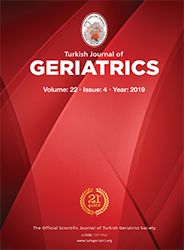2Hatay Mustafa Kemal Unıversity, Hatay School of Nursing, Department of Medical Nursing Hatay, Turkey DOI : 10.31086/tjgeri.2020.123 Introduction: This study was conducted for determining the effect of a walking exercise program on quality of life and sleep in elderly individuals.
Materials and Method: The study was designed as a randomized controlled trial that was stratified by gender, age, and physical activity levels. The study was conducted with 60 elderly individuals, 30 participants in the exercise walking group who participated in the walking program, and 30 participants in the control group without any intervention. The exercise walking group participated in the 40-minute walking program twice a week for 8 weeks. No intervention was made for the control group. In the study, data were collected using the introductory information form, World Health Organization Quality of Life Scale-Elderly Module, and Pittsburgh Sleep Quality Index. The same data collection forms were re-administered to the both groups after the walking program.
Results: A significant improvement was found in the daily walking time (mean±sd=32.16±13.43), quality of life (mean±sd=81.30±2.87) and sleep quality (mean±sd=4.33±2.39), of the exercise walking group participating in the walking program compared with the control group (p<0.001).
Conclusion: It was found that the walking program positively affected quality of life and sleep of elderly individuals. Consequently, this walking program is recommended to be applied in every environment where elderly individuals live.
Keywords : Aged; Walking; Quality of Life; Sleep
